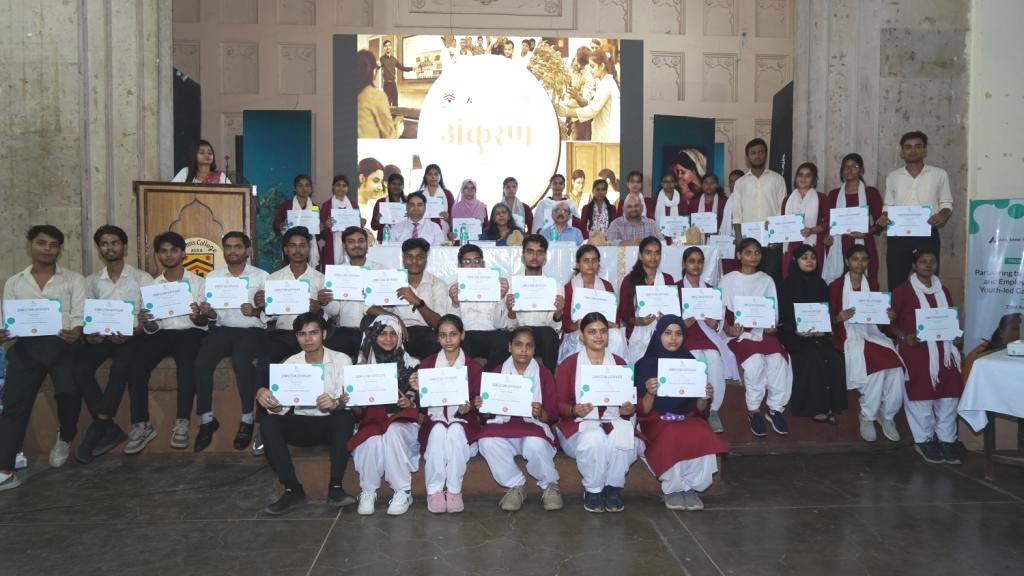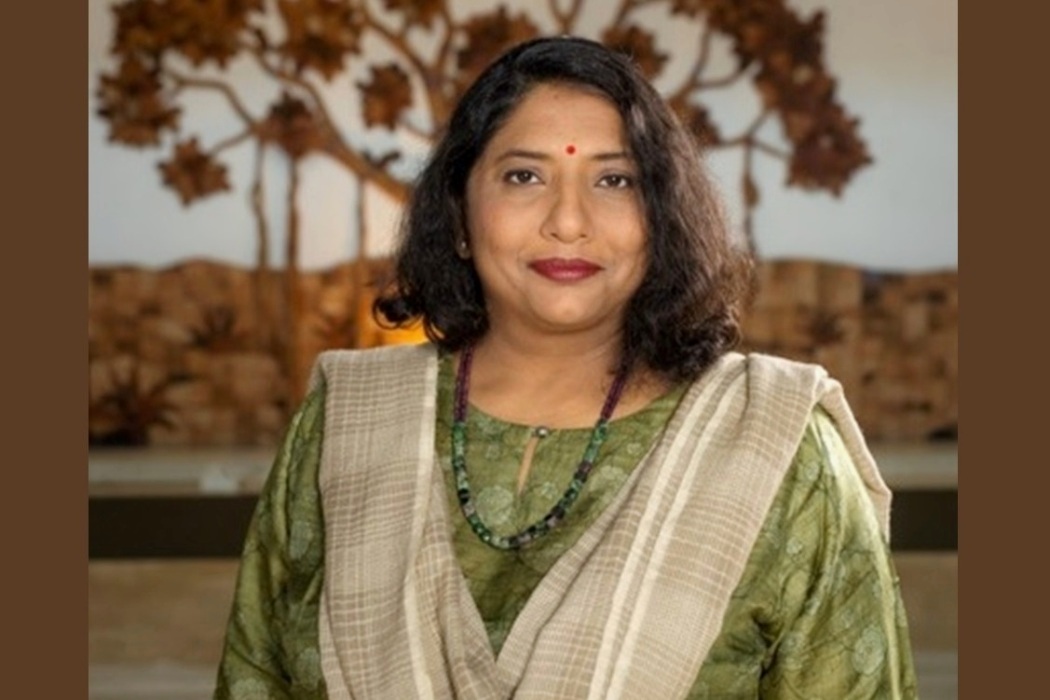In a rapidly changing world of work, where adaptability, digital literacy, and resilience are redefining employability, Axis Bank Foundation (ABF) is steering a transformative journey for India’s youth. Through Mission4Million, ABF is committed to enabling young people—especially from low-income, peri-urban, and rural communities—to build futures of dignity, confidence, and choice.
In this exclusive interaction with TheCSRUniverse, Ms. Dhruvi Shah, Executive Trustee & CEO, Axis Bank Foundation, sheds light on the Foundation’s latest collaboration with Medha, aimed at equipping 16,000 youth across Tier 2 and Tier 3 cities in Uttar Pradesh, Bihar, and Haryana with employability, technical, and vocational skills. The conversation explores how ABF’s inclusive approach combines mentoring, workplace exposure, and career counselling with innovative delivery models—Career Service Centres, virtual platforms, and WhatsApp communities—to ensure both reach and long-term engagement.
Ms. Shah also delves into the rising potential of the gig and freelance economy for rural and semi-urban youth, the importance of partnerships with state education systems and local communities, and the ways ABF measures intangible yet vital outcomes such as confidence and resilience.
Read the full interview below:
Q&A
Q. How does your programme with Medha align with Axis Bank Foundation’s broader mission and strategy in the space of education, skilling, and employability?
A. At Axis Bank Foundation, our endeavour is to enable young people to build futures of dignity and choice. Through Mission4Million, we are deepening our focus on inclusive skill development that reaches youth form low-income families, in peri urban and rural areas including people with disabilities.
Our partnership with Medha builds on this vision. It prepares young people in Tier 2 and Tier 3 cities across Uttar Pradesh, Bihar, and Haryana to participate meaningfully in the economy. The programme goes beyond technical training—it brings together mentoring, workplace exposure, and career guidance to help youth develop clarity, adaptability, and confidence in their career journeys to join the gig work as well as self-employment. By equipping them in this way, we are not only strengthening individual potential but also extending the benefits of skill development to families and communities at large.
Q. The recent collaboration with Medha aims to skill 16,000 youth across Tier 2 and Tier 3 cities. What drove ABF to choose this partnership, and what makes Medha a natural collaborator for this initiative?
 A. For us at ABF, partnerships are built on shared purpose and complementary strengths. Medha was a natural collaborator given its deep presence in Tier2 and Tier 3 cities, where aspirations among young people are high but access to structured opportunities remains limited. Its strong relationships with government colleges, vocational institutes, and community organisations enable authentic outreach and integration within existing systems.
A. For us at ABF, partnerships are built on shared purpose and complementary strengths. Medha was a natural collaborator given its deep presence in Tier2 and Tier 3 cities, where aspirations among young people are high but access to structured opportunities remains limited. Its strong relationships with government colleges, vocational institutes, and community organisations enable authentic outreach and integration within existing systems.
What makes Medha’s approach distinctive is its end-to-end design—combining skill training with counselling, peer networks, and industry linkages. Its focus on emerging opportunities, including the gig and freelance economy, aligns closely with our belief that young people need multiple, flexible pathways to meaningful and sustained careers.
Q. Could you elaborate on how the blended delivery model—Career Service Centres, virtual platforms, and WhatsApp communities—will ensure both reach and sustained engagement with youth?
A. The blended delivery model has been designed to respond to the diverse realities of young people across peri-urban and rural India.
Career Service Centres act as physical anchors—spaces where students can access counselling, hands-on training, and workplace exposure. Virtual platforms complement this by offering flexibility and scale, enabling participation across geographies and socio-economic contexts. WhatsApp communities add a layer of ongoing connection—facilitating peer learning, mentorship, and real-time access to information. Together, these touchpoints ensure continuity, so that the relationship with youth extends well beyond the duration of a course.
We view employability as a journey that demands consistent guidance and evolving support. By combining high-touch human interaction with scalable digital tools and platforms, this model helps young people stay connected, confident, and ready to turn their learning into meaningful opportunities.
Q. A strong emphasis is on the freelance and gig economy. How do you see this shaping long-term career opportunities for young people, especially from peri-urban and rural backgrounds?
A. The freelance and gig economy offers a transformative opportunity for India’s youth, especially those from peri-urban and rural regions. In areas where formal jobs are limited, gig work opens access to emerging sectors such as digital services, beauty and wellness, creative arts, tailoring, and social media marketing. These platforms provide flexibility, immediate earning potential, and exposure to diverse client networks.
We see gig work as an important pathway to entrepreneurship and resilience. It allows young people to build multi skill portfolios, gain financial independence, and test their skills in real market conditions. However, to make this journey sustainable, they need more than technical expertise—they need digital literacy, financial planning, and adaptability. With these capabilities, short-term gigs can evolve into long-term, self-directed careers that enable youth to thrive in a dynamic and opportunity-rich economy.
Q. Do you have an example or early story (from this or other ABF-led initiatives) where youth benefited from similar skilling interventions and transformed their career trajectory?
A. One story that continues to inspire me is that of Nisha Verma from Varanasi, who is visually impaired. Through our partnership with Medha, Nisha transformed her love for learning into a purpose-driven journey. She revived her YouTube channel to create accessible educational content and began tutoring children in her community. In the process, she grew in confidence—as both a teacher and a lifelong learner.
Nisha’s journey reminds us that education and skills are not constrained by disability, but expanded by imagination, determination, and the right support. She continues to inspire those around her, demonstrating how opportunity can unlock potential and purpose. Stories like hers reaffirm why inclusive vocational skill development—reaching women, youth, and people with disabilities—remains central to our vision.
Q. Beyond skills, the programme aims to build confidence and resilience among participants. How does ABF measure these intangible but critical outcomes?
A. Confidence and resilience are not always easy to measure, yet they are often the strongest indicators of lasting change. We assess them through behavioural cues—how participants engage in group discussions, perform in interviews, or respond to workplace simulations. Equally important are the stories that emerge along the way: a student who once hesitated to speak now leads a project team; another who struggled with communication now mentors peers.
Sustained engagement with mentors and peer networks is another sign of growth. For us, success goes beyond securing a first job—it lies in helping young people build the mindset to navigate challenges, keep learning, and continue growing throughout their careers.
Q. ABF has a strong history of working with diverse partners. In your view, how crucial are collaborations with state education systems, community organisations, and industry mentors in sustaining such programmes?
A. Collaboration lies at the heart of ABF’s approach. Sustainable vocational skilling programmes cannot thrive in isolation—they depend on the collective strength of education systems, community networks, and industry partners.
State education systems play a pivotal role in embedding employability training within mainstream institutions, ensuring reach and continuity for students where they already learn. Community organisations bring trust, contextual understanding, and local engagement, making outreach both relevant and inclusive. Industry mentors, in turn, bridge the gap between classroom learning and workplace realities, offering guidance, exposure, and pathways into employment.
Our partnership with Medha brings these elements together, creating an interconnected ecosystem of support. At ABF, we see ourselves as catalysts—strengthening these linkages so they endure well beyond the programme cycle. Only through such collaboration can we ensure that young people are not just skilled, but continuously supported to grow, adapt, and contribute meaningfully to India’s evolving economy.
Q. Skilling programmes in India often face challenges of a mismatch between training and actual employability. How is this programme designed to bridge that gap effectively?
A. This programme has been designed with a dual focus—enhancing both skills and employability. Our partnership with Medha emphasises three key dimensions: relevance, exposure, and adaptability.
Training modules are developed in consultation with industry, ensuring alignment with current and emerging sectors such as digital services, the gig economy, and new-age fields like cloud computing and data analytics. Students gain practical exposure through internships, mentorships, and live projects, enabling them to understand workplace expectations firsthand.
Continuous engagement through bootcamps and peer communities helps them adapt to a dynamic job market. Career counselling is embedded throughout, helping young people align their aspirations with realistic opportunities. By integrating technical training, mentorship, and market linkages, the programme bridges the crucial gap between learning and meaningful, sustainable employment.
Q. How does ABF plan to support trained youth beyond the classroom—for example, through access to markets, entrepreneurship opportunities, or industry linkages?
A. At Axis Bank Foundation, our responsibility does not end when a training programme concludes. We recognise that sustained support is essential for young people to translate their learning into lasting opportunities. Participants continue to engage with mentors, peer networks, and WhatsApp communities that keep them connected, motivated, and supported.
For those pursuing gig or freelance work, we are facilitating access to digital marketplaces and local demand hubs—helping them secure clients, build portfolios, and gain visibility. By creating these linkages, we ensure that youth are not left to navigate the market alone. Instead, they have the networks, confidence, and ecosystem support needed to sustain their careers and contribute meaningfully to their communities and the broader economy.
Q. Finally, what message would you like to share with young aspirants who are entering the workforce in such uncertain but opportunity-rich times?
A. To every young person entering the workforce today, my message is this: see uncertainty not as a barrier, but as an invitation to explore. The world of work is evolving rapidly, with new sectors, skills, and pathways emerging every day. This is an opportunity-rich moment—approach it with curiosity, resilience, and a willingness to keep learning.
Don’t confine yourself to linear careers. Experiment, gain experience, and build skills that help you adapt. Confidence and clarity come through practice and exposure—so step forward with courage.
Remember, employability is not only about technical ability; it is equally about resilience, collaboration, and a sense of purpose. At Axis Bank Foundation, we believe every young person has the potential to chart their own journey with pride. Trust that potential, seek mentors, and embrace opportunities that allow you to grow while contributing meaningfully to the world around you.





 A. For us at ABF, partnerships are built on shared purpose and complementary strengths. Medha was a natural collaborator given its deep presence in Tier2 and Tier 3 cities, where aspirations among young people are high but access to structured opportunities remains limited. Its strong relationships with government colleges, vocational institutes, and community organisations enable authentic outreach and integration within existing systems.
A. For us at ABF, partnerships are built on shared purpose and complementary strengths. Medha was a natural collaborator given its deep presence in Tier2 and Tier 3 cities, where aspirations among young people are high but access to structured opportunities remains limited. Its strong relationships with government colleges, vocational institutes, and community organisations enable authentic outreach and integration within existing systems.












.jpg)



